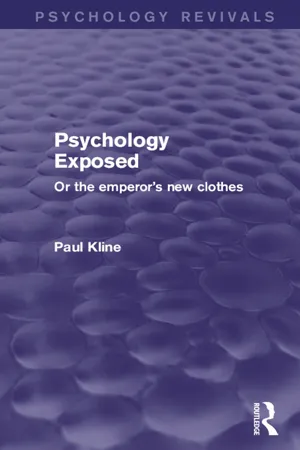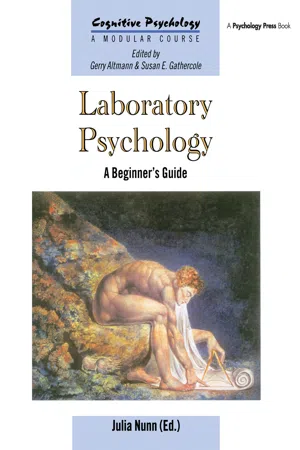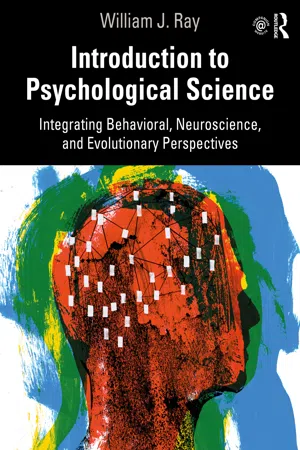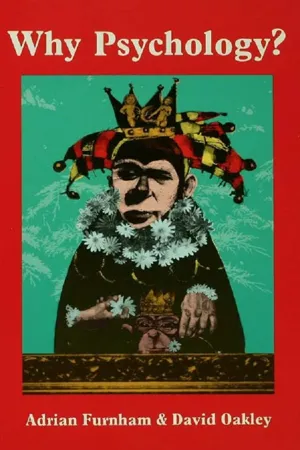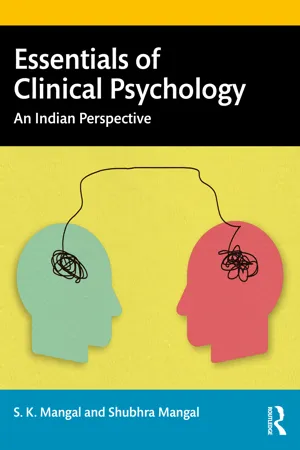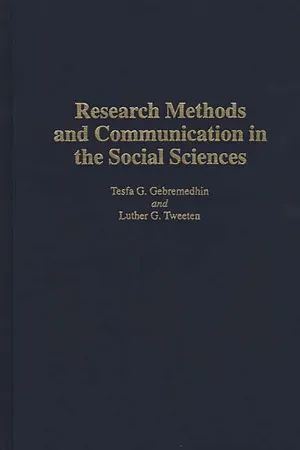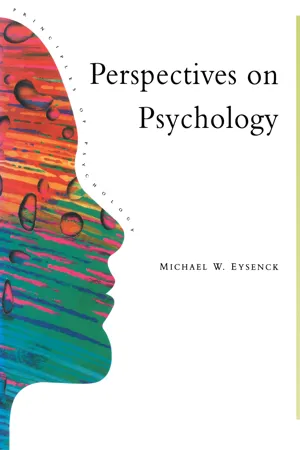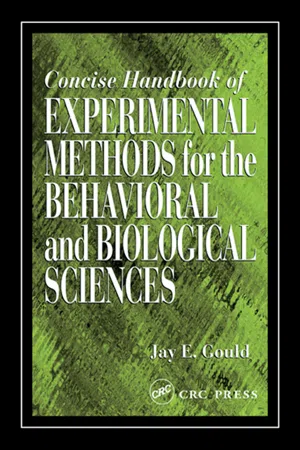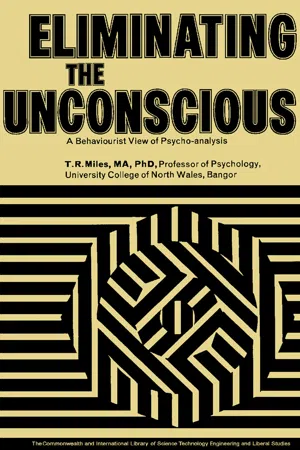Psychology
Scientific Method
The scientific method in psychology refers to a systematic approach used to conduct research and investigate phenomena. It involves formulating a hypothesis, conducting experiments, collecting and analyzing data, and drawing conclusions. By following this method, psychologists can ensure that their research is rigorous, replicable, and contributes to the advancement of knowledge in the field.
Written by Perlego with AI-assistance
Related key terms
1 of 5
12 Key excerpts on "Scientific Method"
- eBook - ePub
Psychology Exposed
Or the Emperor's New Clothes
- Paul Kline(Author)
- 2015(Publication Date)
- Routledge(Publisher)
Chapter two What the Scientific Method is and why psychologists use itThe essence of academic life is dispute. Mediaeval scholars debated how many angels could sit upon the head of a pin, a matter that has still not been finally resolved. This great tradition lives on and thus a clear statement of a position is the life blood of the academic world. It will be seized upon with as much avidity as intellectual torpor allows (all things are relative) and fine exhibitions of hair splitting, references to authorities, footnotes to footnotes will be made. In the Germanic tradition of scholarship the longest list of references will win the day. This makes it exceedingly difficult to state with any precision or clarity what constitutes the Scientific Method.Nevertheless scientists do carry out experiments. They use their findings to develop theories and put them to the test with further experiment. Thus despite the problems of defining Scientific Method, there are de facto definitions in daily use in laboratories throughout the world. Philosophers of science, many of whom have never conducted an experiment in their lives, might well throw up their hands in horror at such a definition, but Scientific Method can be seen as essentially what scientists do. This is the working definition which I shall adopt in this chapter and to ensure its relevance to our aims and purposes, I will restrict myself to the methods used in psychology.The Scientific MethodNevertheless, given the problems of defining the Scientific Method and the not inconsiderable philosophical literature on its nature, I shall briefly examine some of the difficulties in this area, in order that my somewhat pragmatic, not to say behavioural, approach in defining the method, can be free of philosophic error.Many working scientists, I think it is fair to say, follow the scientific logic of their work advocated by Karl Popper in The Logic of Scientific Discovery - eBook - ePub
Laboratory Psychology
A Beginner's Guide
- Julia Nunn(Author)
- 2018(Publication Date)
- Psychology Press(Publisher)
Many’s the time I have heard a student complain that their experiment didn’t “work”. But in a sense all experiments “work” because everything always happens how it “should”—how could it not? However, the theories, or the predictions, or the way in which the predictions are measured and tested, may not be valid. I suspect that the basis for the “it didn’t work” complaint (particularly for its typically despondent tone) may be a hangover from the perception of laboratory science as consisting of a series of demonstrations of what is known to happen for reasons that are known to be true (those pictures of Victorian gentlemen scientists again come to mind). In fact the state of the science of psychology (and, in truth, the other sciences as well) is much more exciting than that. To a very large extent we simply don’t know how things happen—that is why we are engaged in science in the first place—we are trying to find out. Trying to find out why things happen as they do is not easy—in psychology, for reasons considered in the next section, it may be much harder. The process of conducting scientific psychology entails much critical questioning and rigorous examination of theory, method, and conclusion. But that is not a reason to abandon the effort to engage in scientific psychology; in fact it is a very good reason why psychology must apply scientific standards with even greater effort.Some objections to experimental psychology
It cannot be denied that there have been many thoughtful and highly influential criticisms of experimental methods in psychology—many of them coming from psychologists themselves. In this section I will briefly consider two of these objections and what can be said or done to counter or appease them.Scientific psychology cannot be applied to the real world
When one goes about the process of systematically collecting observations of behaviour under controlled conditions one often reduces the complexity of human action to its much simpler constituent processes. This piecemeal approach to the study of behaviour enables psychologists to gain a measure of control. In conducting a laboratory experiment, for example, psychologists quite deliberately create an artificial situation which is an attempt to model some aspect of the real world. For example, research into the effects of alcohol on driving was not conducted using subjects driving a real car but instead used a driving simulator. Aside from the ethical problems involved in administering alcohol to car drivers, the fact that it is only a model of reality and not the real-world situation means that it is possible to obtain some systematic measurements of performance which will be uncontaminated by other variables. For example, with a simulator one could perfectly control the weather and traffic conditions, the nature of any hazards, and the way the car responded to the brakes and steering. One might also try to ensure that none of the participants in the experiment was sleep-deprived or taking any medical treatments or extremely short-sighted or very old. - eBook - ePub
Psychology in Historical Context
Theories and Debates
- Richard Gross(Author)
- 2017(Publication Date)
- Routledge(Publisher)
● This represents a contradiction within his own thinking. On the one hand, he embraced the Enlightenment beliefs that if people are free from the strait-jackets represented by the Church, monarchy, and aristocracy, they would be able to create a better society where justice and liberty would flourish. On the other hand, people are too easily swayed and need the guidance of philosophers and scientists to find their way.(Based on Hewett, 2008)Even within the context of natural science, many (if not most) of the features listed in Table 2.1 have been challenged. In the following sections, we shall describe some of these challenges and begin to ask how the use of the methods used in natural science can be appropriately applied to the study of human psychology.Empiricism
We noted in Chapter 1 that the vast majority of Psychologists would regard themselves as Methodological Behaviourists: reflecting the legacy of Watson, the use of empirical (scientific) methods, in particular controlled experiments, is a taken-for-granted modus operandi for most research Psychologists. This quantitative approach is part-and-parcel of what is commonly referred to as mainstream Psychology.More generally, belief in the necessity of collecting data in some form and exposing those data to some form of analysis is a principle shared probably by all Psychologists – including those who are clearly not Experimental Psychologists and who offer radically different alternatives to the experimental approach, such as discourse analysis and other qualitative methods. (These are discussed further below in relation to Social Constructionism.)In In Defence of Empirical Psychology (1973), Donald Broadbent, an ardent Behaviourist (and also a highly influential figure within Cognitive Psychology: see Chapters 1 and 6 ), equated empirical Psychology with Behaviourism. He also points out that ‘empirical Psychology’ has two meanings: (1) the one relating to Methodological Behaviourism as described above; and (2) a philosophical account of human nature with Associationism at its core (as proposed by the British empiricists, most importantly Locke: see above); this became central to Watson’s brand of Behaviourism (see above and Chapter 6 ). In this second sense, ‘empiricism’ denotes the view that all, or most, of our knowledge is derived from our experience of the external world; it is usually contrasted with rationalism, according to which our knowledge is prior to, and independent of, experience (e.g. innate/inborn, or derived from logical reasoning). These extreme views lie at the heart of the nature–nurture debate, which has run through much of mainstream Psychology’s history (see Box 2.6 - eBook - ePub
Introduction to Psychological Science
Integrating Behavioral, Neuroscience and Evolutionary Perspectives
- William J. Ray(Author)
- 2021(Publication Date)
- Routledge(Publisher)
The story of Clever Hans shows us that all organisms, including humans, are sensitive to their environment. This is true whether we are interacting with other people or being part of an experiment. Thus, in psychological experiments there are a number of opportunities for those who are researchers to influence those who are participants in ways that were never intended. Participants can also influence researchers. For example, participants in experiments may respond to their own ideas or internal demands rather than those of the experiment itself.What Are the Methods of Science?The methods of science closely parallel our ways of learning about the world. We interact with the world and gain new knowledge and understanding of what we experience. However, in doing psychological research, we do this in a more organized and logical manner. We may observe and describe what we see, which is referred to qualitative research. We can also measure and report the number of specific factors that can be used in a mathematical manner, which is referred to as quantitative research. The scientific approach emphasized in this chapter will describe both qualitative and quantitative approaches. In both, researchers approach a particular question or topic in a logical manner. We can think about a critical approach to science in terms of four stages.- Scientists first begin with an idea or expectation. A formally stated expectation is called a hypothesis. The scientist says, “I expect this to happen under these conditions,” and thus states the hypothesis.
- Second, scientists look to experience to evaluate the accuracy of their ideas or expectations about the world. That is, they try to find or create the situation that will allow them to observe what they are interested in studying.
- Through observation and experimentation, scientists can begin to evaluate their ideas and expectations about the world. Learning about the world through observation and experimentation is an example of empiricism
- eBook - ePub
- Adrian Furnham, David Oakley(Authors)
- 2013(Publication Date)
- Psychology Press(Publisher)
Chapter 3 Major research methods in psychology Psychologists study everything from memory in the octopus to schizophrenic breakdown in people. They study issues as diverse as learning, perception and social behaviour. As such they need a wide range of methods to investigate the issues that fascinate them. How psychologists go about their research is in itself interesting. They have to be imaginative and flexible because of the diversity of things they study and because if people are aware they are being studied their behaviour may not be typical. The research process Scientific knowledge is knowledge obtained by both reason and experience (observation). Logical validity and experimental verification are the criteria employed by scientists to evaluate claims for knowledge. These two criteria are translated into the research activities of scientists through the research process. The research process can be viewed as the overall scheme of scientific activities in which scientists engage in order to produce knowledge; it is the paradigm of scientific inquiry. As illustrated in Figure 3.1, the research process consists of seven principal stages: problem, hypothesis, research design, measurement, data collection, data analysis, and generalization. Each of these stages is interrelated with theory in the sense that it is affected by it as well as affecting it. The most characteristic feature of the research process is its cyclic nature. It often starts with a problem and ends in a tentative generalization based on the experimental evidence. The generalization ending one cycle is the beginning of the next cycle. This cyclic process continues indefinitely, reflecting the progress of a scientific discipline. The research process is also self-correcting. Tentative generalizations to research problems are tested logically and empirically. If these generalizations are rejected, new ones are formulated and tested - eBook - ePub
Study Skills for Psychology
Succeeding in Your Degree
- Richard Freeman, Antony Stone(Authors)
- 2006(Publication Date)
- SAGE Publications Ltd(Publisher)
7 ). And, of course, you need to reflect on what you are trying to achieve and to reflect on past mistakes you have made in your practical work to ensure that you don’t make them again.The Scientific Method
It is important to have a basic understanding of what is meant by the Scientific Method, although you should be aware that there are many controversial questions about how science works.In essence science works by testing theories. It does this by deducing predictions from a theory and then testing to see whether or not the prediction turns out to be true or false. (If the idea of deducing a prediction from a theory is not familiar to you, it is explained below.) If the test shows that the prediction is true, that’s good news for the theory as it has received some confirmation. But if the prediction turns out to be false, then that’s bad news for the theory, and it will either have to be rejected or amended. In psychology, we usually call such predictions ‘hypotheses’. This is called the ‘hypothetico-deductive method’.Here’s an example from psychology. In the 1950s, the American psychologist Tolman was interested in testing a theory about animal learning that said that animals learn only when they are rewarded. For instance, if hungry rats are placed in a maze they will gradually find their way out. If you reward the rats with food each time they find their way through the maze, then they get better and better at finding their way through as measured by a decreasing number of wrong turns, for example. Let’s call this condition 1 – where hungry rats are rewarded. Rats that are hungry but are never rewarded do not improve their performance. Let’s call this condition 2 – where hungry rats are never rewarded. Tolman wondered whether the unrewarded rats might nonetheless be learning about the fastest way to get through the maze, but not demonstrating their learning because they had no motive for doing so. So, he introduced a third condition – where a group of hungry rats were treated as in condition 2 for the first ten days of the experiment, but then rewarded on the eleventh day. He predicted that if they were learning, then their performance on getting through the maze should dramatically improve on the twelfth day. His prediction was confirmed. The rats’ performance did dramatically improve on the twelfth day in condition 3. This provides confirmation for his idea that rats learn even when not rewarded. - eBook - ePub
Essentials of Clinical Psychology
An Indian Perspective
- S. K. Mangal, Shubhra Mangal(Authors)
- 2023(Publication Date)
- Routledge(Publisher)
performing such experiments, we try to establish certain cause-and-effect relationships through objective observations of the actions performed and the subsequent changes produced under pre-arranged or rigidly controlled conditions. From these observations, certain conclusions are drawn and theories or principles are formulated.It is a widely used and favored method of investigation employed by clinical psychologists all over the globe for carrying out the needed research work in clinical psychology. Their choice has merit, as the experimental method may be said to comply with all the requirements needed for a method being called a Scientific Method, as follows:- It provides the opportunity to carry out experimental work for researchers to make the most careful systematic observations of the behavior of clients in controlled conditions otherwise unavailable through the use of other methods of investigation.
- It provides scope for the prediction of the behavior of clients by establishing cause-and-effect relationships between two variables (the things and phenomena that stand to vary and change in the social environment) related to clinical behavior.
Understood in this way, the experimentation method, in the shape of a formal definition, may be termed a type of research method aimed at establishing the possible cause-and-effect relationship between variables under study through systematic and well-planned observations carried out under controlled conditions.In this definition, we have mentioned a few terms such as variables and control of experimental conditions for the employment of the experimental method on the part of investigators. Let us know about them.- Variables: A variable in an experimental study stands for any characteristic or condition (of the clients and the social environment) that is liable to be varied and thus can be attributed with different values. A researcher may encounter a number of variables that need to be manipulated, controlled, or observed as per the requirement of their research study. These variables are known and classified as independent, dependent, and extraneous or intervening variables.
- Independent variable: In an experimental study, the term independent variable stands for the type of variable controlled by the experimenter. The researcher deliberately manipulates and varies it for observing its effects on the dependent variable.
- Dependent variable:
- Tesfa G Gebremedhin, Luther G. Tweeten(Authors)
- 1994(Publication Date)
- Praeger(Publisher)
Problems are addressed by the method of investigation in an attempt to obtain evidence related to a hypothesis. The hypothesis directs the thinking of the researcher. If the problem is stated as a question, then each hypothesis is a possible answer to the question or a possible explanation. Data are gathered, and the hypothesis is tested as the analysis proceeds under a prescribed procedure. 2 Research Methods and Communication in the Social Sciences The Scientific Method provides the framework for collecting and organizing the data so that they can be analyzed and interpreted. The collection of data highlights the empirical component of scientific research. Scientific research is not merely gathering data for the purpose of accumulating facts. Interpretation of the data is a key component of the research process. Interpretation employs a conceptual framework. A hypothesis that has gained widespread professional approval because it makes sense in a causal system and has not been rejected in repeated empirical sampling by numerous analysts working independently is sometimes called a principle, theory, or law. A law has value not only because it accounts for ("explains")past observations but also because it predicts future observations and experiments. Scientists need to retain a healthy skepticism. Hence laws or theories ordinarily are viewed as unrejected hypotheses that may be discarded for more plausible explanations and predictors as evidence accumulates (Barrass, 1978;Tuckman, 1978). The scientific research method draws conclusions based on the weight of evidence. Sometimes the evidence is quantified and statistical inference is used to measure the likelihood of making errors. Statistical inference enables the analyst to reject or fail to reject hypotheses based on probability. Due to the possibility of error in sampling and in measurement, analysts ordinarily do not accept a hypothesis.- eBook - ePub
- Michael W. Eysenck(Author)
- 2013(Publication Date)
- Psychology Press(Publisher)
The most common way in which scientists (including psychologists) attempt to test their hypotheses is by means of experiments. Although this is frequently the most effective method available, the history of science demonstrates very clearly that scientific progress does not necessarily depend on carrying out laboratory experiments. Consider, for example, the science of astronomy. In spite of the fact that astronomers generally don't carry out experiments in the normal sense, they have been able through careful observation to obtain much valuable information about the nature of the universe.In similar fashion, many important issues in psychology cannot be examined under laboratory conditions. For example, those who have been exposed to traumatic events (events causing a powerful shock) such as a major accident or kidnapping, sometimes subsequently develop a condition known as post-traumatic stress disorder. It is very important for psychologists to try to understand the processes triggering this disorder, but it would be completely unacceptable in ethical terms to attempt to produce this disorder under experimentally controlled conditions.Goals of science
What are the goals of science? As Malim et al, (1992) pointed out, three of the main goals are as follows:- prediction;
- understanding ;
- control.
The theories formed by scientists permit them to make predictions or hypotheses about what will happen in situations that they have not previously investigated. For example, psychologists such as Thorndike discovered that animals could be persuaded to behave in certain ways if their behaviour was followed by reward or reinforcement. This led them to predict that the same would be true of the human species. The success or otherwise of predictions stemming from a theory are of great importance: any theory that generates numerous incorrect predictions must be seriously flawed.Even if a theory generates a large number of accurate predictions, it does not necessarily follow that we will have a good understanding of what is happening. For example, a theory of memory proposed by Craik and Lockhart (1972) included the prediction that memory will be better for material that has been processed in terms of its meaning than for material that has not. Although this prediction has been confirmed experimentally several times, the precise reasons why it is beneficial to process meaning still remain unclear. - eBook - PDF
The Scientific Method
A Guide to Finding Useful Knowledge
- J. Scott Armstrong, Kesten C. Green(Authors)
- 2022(Publication Date)
- Cambridge University Press(Publisher)
We concluded that the key elements of the Scientific Method – as derived from the words of famous and pioneering scientists – could be summarized by eight criteria: 1. Study important problems 2. Build on prior knowledge 3. Provide full disclosure 4. Use objective designs 5. Use valid and reliable data 6. Use valid simple methods 7. Use experimental evidence 8. Draw logical conclusions These criteria are also consistent with the Oxford English Dictionary (OED), which defines the Scientific Method as: commonly represented as ideally comprising some or all of (a) systematic observation, measurement, and experimentation, (b) induction and the formulation of hypotheses, (c) the making of deductions from the hypotheses, (d) the experimental testing of the deductions, and (if necessary) (e) the modification of the hypotheses . . . The modern Scientific Method is often seen as deriving ultimately from Francis Bacon’s Novum Organum (1620) and the work of Descartes. In the 20th century, Karl Popper’s idea of empirical falsification has been important. OED Online (2018). In practice, a study can contribute to making a useful scientific discovery even when it does not on its own comply with all of the criteria. For example, Einstein drew on the findings of others’ experiments to develop novel hypotheses about important problems that could in turn be tested against alternative hypotheses by further experiments. Papers might also contribute to science by identifying important problems. Others might contribute by identifying shortcomings in the papers of other researchers and resolving those issues. Another contri- bution is to develop objective measures of important variables, and compile data using those measures, as has been done by scientists at the University of Alabama at Huntsville in estimating global average temperatures from satellite readings (Spencer et al., 2017). 11 / An Aspirational Definition - Jay E. Gould(Author)
- 2001(Publication Date)
- CRC Press(Publisher)
The following are some important general points : 1. There is a good deal of overlap and interrelatedness among the steps. 2. Scientists, therefore, often move back and forth between these steps. 3. The steps might be listed somewhat differently by different scientists. — Such variations, however, just represent complementary approaches to the gen-eral Scientific Method. • Example : Inductive method versus deductive method are two important com-plementary strategies used in science (covered later in this chapter under Hypothesis Formulation). 52 Concise Handbook of Experimental Methods Primary Steps There are seven major steps involved in the Scientific Method of research: 1) formulate a problem, 2) formulate a hypothesis, 3) design a study, 4) collect and organize the data, 5) summarize and statistically analyze the data, 6) evaluate the results and draw conclusions regarding the hypothesis, and then 7) communicate the findings. 1. Formulate a Problem — The starting point of any scientific inquiry is a research problem/question about the nature/description of, or the explanation for, some phenomenon. • Example: What is the cause of clinical depression? 2 . Formulate a Hypothesis — Next, a hypothesis is put forth as the possible answer/solution to the problem’s question. • Typically, this is a statement about the conjectured relationship among the factors that will be investigated (the independent and dependent vari-ables). ∞ Example: A deficiency in the serotonin neurotransmitter mechanisms of the brain is the cause of clinical depression. 3. Design a Study — The design is a plan for gathering data to test the hypothesis . • Scientists must determine whether the hypothesis is probably true or prob-ably false . ∞ In other words, does the hypothesis appear to solve the problem — does it answer the research question ? • Experimental designs are the most powerful designs for research (discussed earlier in Chapter 2).- eBook - PDF
Eliminating the Unconscious
A Behaviourist View of Psycho-Analysis
- T. R. Miles, G. P. Meredith(Authors)
- 2013(Publication Date)
- Pergamon(Publisher)
CHAPTER II Psycho-analysis and Scientific Method THE purpose of this chapter is to examine if there is anything inherent in psycho-analysis which would prevent it from having the status of a systematic science. I shall argue that, unless the word science is understood in a very rigid and narrow sense, it is perfectly possible for psycho-analytic investigations to be scientific. If a scientific approach is to be achieved, however, it is neces-sary to make completely explicit the grounds on which psycho-analytic claims are based and to formulate a terminology which is more effective than the present one in exhibiting what those grounds are. As I hope to show later, the present terminology, which involves reference to entities such as the unconscious and the super-ego, is a hindrance rather than a help as far as scientific progress is concerned. A revised terminology is needed in terms of which we can describe and explain what people say and do in the analytic situation (and indeed outside it) without our being committed to belief in minds or psychical structures whether conscious or unconscious. The behaviourist terminology which I have set out in this book is offered as an attempt to meet this particular need and thus contribute in a small way towards establishing psycho-analysis as a rational systematic enquiry. Much, of course, has already been written on the methodo-logical problems of psycho-analysis. Some of the more important references, in my view, are Ellis< 3 >, Feigl and Scriven (s ) (eds.) (especially the articles by A. Ellis, B. F. Skinner, and A. G. N. 5 6 ELIMINATING THE UNCONSCIOUS Flew), Hook< 7 > (ed.), Maclntyre* 11 ), Pumpian-Mindlin* 1 *) (ed.), and Sears* 17 ). I do not, however, in this chapter propose to comment in any detail on the work of others, but to look afresh at the concept of Scientific Method and to re-open the question of what being scientific involves.
Index pages curate the most relevant extracts from our library of academic textbooks. They’ve been created using an in-house natural language model (NLM), each adding context and meaning to key research topics.
